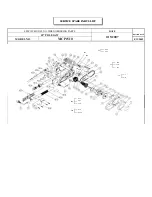
0.6
Master Disconnect
Lock-out the machine before undertaking any maintenance or repair work on it. ‘Lock-out’ refers switching
off the master electrical disconnect switch, and locking it out so that it cannot be switched on again
without authorization.
On Hyd-Mech machines the Master Disconnect Switch will be of one of four types:
•
Rotary switch mounted in electrical control cabinet door and inter-locked with door.
•
Rotary switch mounted on the side of the operator interface console.
•
Lever switch mounted in separate box mounted on the machine.
•
Supply disconnect switch supplied by user at installation and usually wall-mounted within sight of
the machine, depending upon local regulations.
In almost all jurisdictions, it is required that owners of industrial equipment establish and post
lock-out procedures. Know and use the lock-out procedures of your company or organization.
Residual Risks
The machine is still not completely de-energized if an electrical cabinet door type switch is
locked-out.
The line side of the disconnect switch itself remains energized.
Variable speed blade drives store dangerous voltage in their capacitors, and this requires time to
dissipate. After locking out power, wait 3 minutes before beginning to work on machine electrical
circuits.
If compressed air is supplied to the machine to power a mist lubrication system or other devices,
it should be disconnected, and any stored air pressure released before working on the machine.
The weight of individual machine components represents stored potential energy that can be
released if they fall when disconnected. Secure these components with adequate hoisting gear
before disassembly.
SAFETY HAZARD LABELS
The safety hazard labels attached to your machine represent important safety information to help you avoid personal injury
or death.
All supervisors, operators, and maintenance personnel must locate and understand the safety information associated with
each hazard label prior to operating or servicing the machine.
The safety hazard labels shown below are located at various positions on the machine to indicate possible safety hazards.
The location and re-order part number of all the safety labels associated with this particular model of bandsaw are indicated
at the end of this section of the manual. It is important to replace any safety hazard label that becomes damaged or illegible.
HAZARDOUS VOLTAGE INSIDE
Contact with high voltage may cause death or serious injury. Never perform
maintenance on, or near, electrical components until the machine’s electrical
power source has been disconnected. Lock-out power in accordance with your
company’s lock-out procedures before any such maintenance. The “Stop” or
“Emergency Stop” push button does not disconnect the machine’s power supply.
Hazardous voltage is still present in the machines electrical circuits.
The machine’s Electrical Disconnect Switch does disconnect voltage from the
machine’s circuits; however hazardous voltage is still present inside the main electrical cabinet, on the infeed (line) side of
the main fuses. Therefore keep hands and tools away from the infeed side of the control panel main fuses. If these fuses
need to be replaced, use a fuse puller.
Allow three minutes after locking-out power before opening any electrical enclosures. Your machine may be equipped with a
variable frequency drive that stores high voltage within its capacitors. Three minutes will allow sufficient time for this voltage
to safely discharge.
Never spray coolant directly at electrical components or cabinets.
Summary of Contents for S23P SERIES II
Page 2: ...2 ...
Page 16: ...1 4 ...
Page 31: ...4 1 ELECTRICAL SCHEMATICS SEE PDF ON ATTACHED CD SECTION 4 ELECTRICAL ...
Page 32: ...4 2 ...
Page 33: ...5 1 SECTION 5 HYDRAULIC HYDRAULIC SCHEMATICS PLUMBING DIAGRAMS SEE PDF ON ATTACHED CD ...
Page 34: ...5 2 ...
Page 36: ...6 2 ...
Page 37: ...7 1 OPTIONAL ASSEMBLY DRAWINGS SEE PDF ON ATTACHED CD SECTION 7 OPTIONS ...
Page 38: ...7 2 ...
Page 40: ...8 2 S 23P II LAYOUT ...
Page 42: ...9 2 ...











































